Natural vs. Synthetic Corks: A Mystery Solved and an Ongoing Debate
By Evan Dawson, Finger Lakes Correspondent
Photo by Morgan Dawson
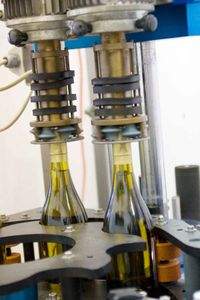
I nearly sprinted down to my basement — ahem, cellar — when Lenn made a bit of a shocking announcement last week: His 2007 Ravines Argetsinger Riesling was closed with a synthetic cork. This is a very highly regarded wine (Lenn included it in his 2008 wines of the year) and it seems destined to improve with time. Wine Spectator gave it 89 points and advised readers to "drink now through 2009;" I found that assessment to be wholly misguided and actually wrote, in silver marker, the words "drink after 2020" on one of the Argetsinger bottles that we're holding. Ambitious, sure, but Finger Lakes Rieslings are building an impressive track record for ageability.
So I was relieved to discover that my Argetsinger Riesling was closed with natural cork. But how did Lenn get synthetic closures?
"Bottling line error," Ravines owner and winemaker Morten Hallgren explained. Hallgren said that after bottling his Keuka Village White with synthetic corks, the line should have shifted immediately to natural corks. Instead, it allowed a small amount of bottles — "No more than five cases," Hallgren says — to get the cheaper, synthetic corks. Having placed an early order, Lenn was the not-so-lucky winner of those mistakenly closed bottles.
"We'll absolutely replace the bottles for Lenn and for anyone who wants to hold them," Hallgren says. He recognizes that the vast majority of consumers of Finger Lakes wine drinks it within months, not years, of purchase. But Hallgren hopes that will change: "We believe very strongly in age-worthy wines, and there's none better for the Finger Lakes than Riesling."
Hallgren agrees with the wider consensus that any wine with aging potential needs a natural cork. Some producers, however, are turning more to synthetic corks for cost-saving reasons — synthetic corks generally cost a fraction of what natural corks cost. And so with Finger Lakes wineries dealing with more competition and a lagging economy, as well as a wine-drinking public that has little interest in aging wine, should synthetic corks be scorned?
For now I'll just say I'm glad that all of my best Finger Lakes bottles — including the Argetsinger Riesling — are closed with natural cork.







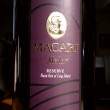
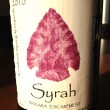

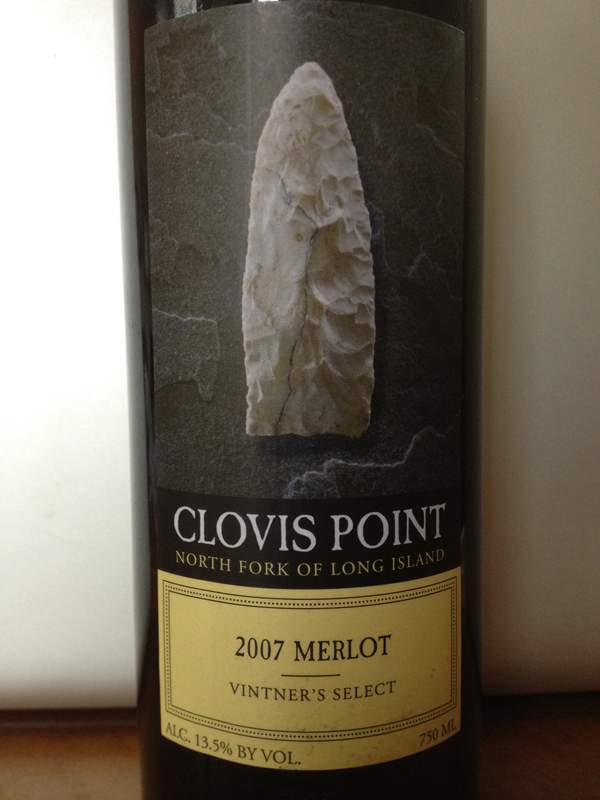
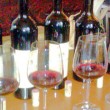




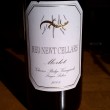


Thanks for following up with this story, Evan.
I tasted another Finger Lakes wine over the weekend, a cab franc from Hunt Country, that I enjoyed quite a bit (review coming here on the blog) that also had a synthetic closure. No one thinks that Finger Lakes franc has the aging potential that riesling does, but it did seem to have enough structure for 5-7 years of cellaring. And from what I’ve been told, this particular type of synthetic cork has a life of about 5 years before it starts to fail. Bummer.
I wonder if FL wineries would ever start offering a choice of closure (when selling futures) or might start bottling a certain amount under synthetic for immediate consumption (we all know that not everyone is going to hold these wines) but also bottle some under natural cork for the geeks out here.
I know that I’d pay an extra 30-50 cents per bottle for natural cork most of the time… until I get home and find that TCA has infested the bottles. But that’s another story for another time.
Lenn,
This is not meant to pick on your assessment of ageability; frankly, just about all respected wine critics assess ageability in similar manners. But I don’t think any of us know with any certainty how long a Finger Lakes Cab Franc can improve with age before starting to decline. Five to seven years sounds like a good guess, but what kind of real tasting experience do any of us have with those kinds of wines? It would take dozens of bottles for me to make a pronouncement with confidence.
Again, this is not to critique your critique. I would make roughly the same guess with a wine like Hunt Country Cab Franc. But the point is a synthetic closure robs us of any chance to truly find out. And for me, there is nothing better than experiencing a wine with some age. I don’t even mind if it’s past its prime; better to find out than to never see. And we won’t be able to see with wines like the one you’re describing.
While I personally prefer natural corks and all the uncontrolled variables they add to aging wine, I’ve come across winemakers that use Nomacorc synthetics that are proven (by their own studies) that they do allow transfer of air and consistent aging.
This bottling line “error” with those five cases should be repeated by more wineries so we can taste the difference down the line.
That being said, I’ll never bottle my home-made wine with synthetics. It’s just not very sexy uncorking one.
I think a lot of wineries are experimenting with different kinds of closures… I recent drank a Tablas Creek wine that had a Stelvin closure… and last year even had one with a glass cap.
Naturally this confuses us at my house and Kevin inevitably pokes through any offending screw caps with the corkscrew. Sigh.
I was shocked to drink a White Burgundy from Girardin, a well negociant/producer, with a Stelvin closure! After several discussions with Kareem Massoud of Paumanok, and too many corked bottles, I am no longer convinced of the need for cork. True, there may be some wines out there that need 20 years of cork aging, but I and the overwhelming majority of wine drinkers are not buying and keeping them.
Evan: No offense taken at all. You’re right, I’m guessing on how long the Hunt Country CF will evolve/improve.
Bryan: Everyone I’ve talked to says that Normacorcs have a 5-year life before they start to fail. Have you heard otherwise?
Jay and Gretchen: I know very little about how wines age under Stelvin, but for fresh, “drink now” whites, I think they are ideal.
I had a 2001 or 2002 Pagani Vineyard Mourvedre from St. Francis with a synthetic cork a few months ago. I was very surprised, and wouldn’t have held onto the bottle that long had I known. Thankfully, the wine was excellent, with no off flavors transferred from the closure and no oxidation. (Why was St. Francis using synthetic cork?)
Talked to a cork rep recently who said the current industry belief is that cork does not allow any transfer of oxygen into the bottle. It does, however, gradually release oxygen that is trapped within the body of the cork itself. I have not seen a study that backs this up.
Cal -
Very interesting on cork; that’s the first I’ve heard of that as well. I’d love to learn more, but for now that’s hard to believe.
By the way, I’m always looking to try more Mourvedre. Was this one a new world or old world style?
From an ecological standpoint, natural cork is the “greenest” choice. There are numerous studies that have been done by cork manufacturers, plastic cork manufacturers and screw top manufacturers, Cork seems to come out on top every time - especially where cork is then recycled. Cork is farmed from trees and is completely renewable. The trees live 100 years and scrub CO2 from the air. Environmental concerns are one reason we use cork. The other reason is that I don’t think there is enough data on what might leach out from the plastics into the wine over time and varied storage conditions. Glass and cork are neutral, recyclable, proven and safe.
I have had the opportunity to taste FL wines that are older, including some 20 year old late harvest Rieslings and Cab Francs in the 10 year range. These were wonderful examples of the potential of NY wine.
Is he kidding? Replacing bottles because they used a superior closure? There is only one scientifically established reason to use corks anymore.. Oh I’m sorry, I forgot, there isn’t a scientifically established reason.
Jonathan Hull
Applewood Winery
http://www.applewoodwinery.com
Jonathan,
I’d love for you to elaborate, as you’re clearly in the minority among wine industry professionals. Thanks.
Randall Grahm has declared that”Cork is Dead” (He even held a funeral complete with a corpse in Grand Central Station).
Cork is a centuries old invention that has served us well but is now just flat out, well, outdated. Cork has many problems to numerous for me to list here.
Anecdotaly, I used corks for many years in my winery. They were high quality corks but as our production increased we began to notice problems occasionally. Some of our beautiful children were a little, you know, off. That’s to be expected with kids, but not with my wine thank you. We knew where the wine came from, where and how it was stored.
Our estimation, it was the cork. Why do you send two bottles of wine to the beauty pageant? Why does the waiter let you test the wine? Why do people sniff the cork. Because sometimes it STINKS! (No fun when you open it at the dinner party back home either.)
Traditions can be a great thing. We should pay attention to them. They can inform you with communal knowledge of our past. But sometimes they can fog your judgment too.
Vinuous regards,
Jonathan Hull
Http://www.applewoodwinery.com
Jonathan,
Thanks for posting. The problems with natural corks are well documented, but I think we’d all agree that just because a natural cork is imperfect does not mean we ought to replace it with any old closure. In other words, there is no perfect fix, but synthetic closures have their own serious flaws as well, no? And screw caps as well?
this is soooo stupid.
why are we storing our french wines with synthetic corks horizontally in our wine cellars? hello?
Anybody see something odd here?
Do we need to keep the plastic cork moist?
Does the extruded PE out-gas to the wine (like most other plastics)?